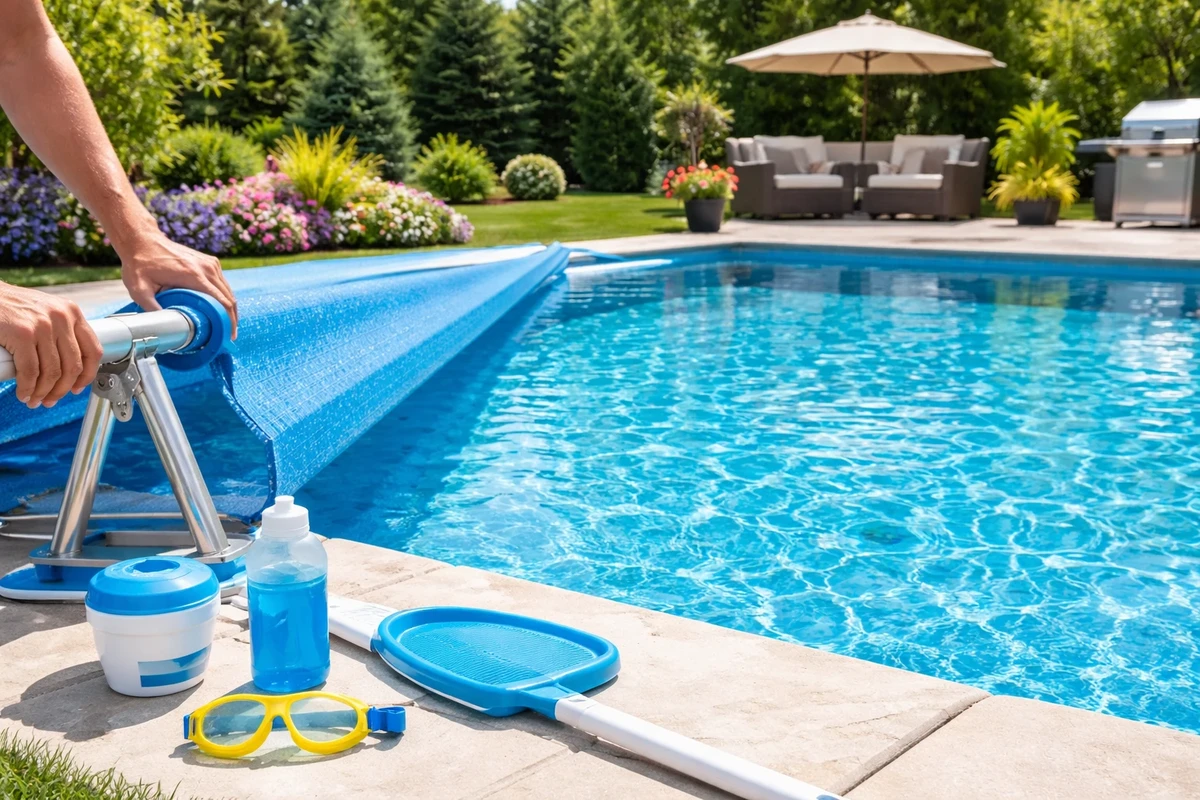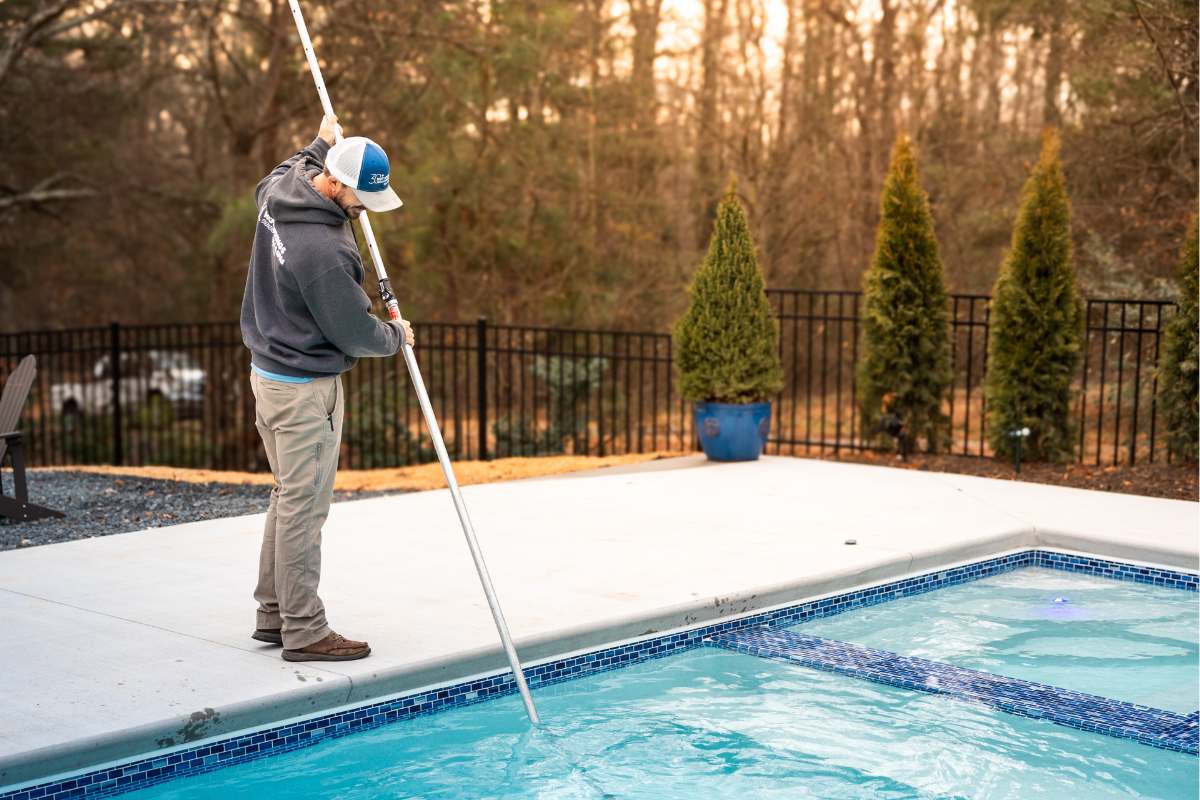As summer reaches its zenith and temperatures climb, pool owners often grapple with managing an overheated pool, which should ideally serve as a calm refuge rather than a lukewarm soak. Ensuring your pool remains a comfortable escape is crucial for the enjoyment and safety of users, as well as for the upkeep and durability of the pool itself. This trusted pool builder's guide delves into various strategies for reducing your pool's temperature, ensuring it stays a refreshing haven during the warmest days.
Aerators and Water Features
Integrating aerators and water features is among the most straightforward and economical approaches to cool your pool. Aerators spray the water into the air, allowing for evaporation and cooling before it reenters the pool.
Water features, such as fountains and waterfalls, add visual appeal and assist in cooling by enhancing the water's exposure to air. Bubblers, or small jets, generate a gentle air flow that aids this cooling process. These installations decrease the pool's temperature by several degrees and boost water circulation and quality.
Pool Chillers and Heat Pumps
Pool contractors know that pool chillers and heat pumps represent a more significant investment but offer effective temperature control. Pool chillers lower the water's temperature by circulating it through a cooling system, analogous to an air conditioner. Both air-cooled and water-cooled chillers are available, with the latter typically being more efficient.
Heat pumps offer a versatile solution for both warming and cooling pool water. Though these systems require an upfront investment and professional installation, they provide a sustainable method for maintaining ideal pool temperatures.
Maintaining Proper Water Chemistry
Maintaining the proper water chemistry also helps prevent skin and eye irritations. It keeps the pool equipment from getting damaged over time. High pH and alkalinity levels can cause corrosion, while low levels can result in scaling and staining. Unbalanced chemical composition may also reduce the lifespan of the pool's filter and pump, which can be costly to replace.
Caring for your pool's water chemistry is crucial to pool maintenance. Regular testing and adjustment of chemical levels can help ensure that your pool remains safe, clean, and enjoyable for years to come while also allowing you to avoid costly repairs down the line.
Shade Solutions
Adding shade to your pool area can offer immediate relief from the sun's intensity. Shade structures like umbrellas, pergolas, and canopies protect against direct sunlight. They can lower the pool's temperature by reducing solar heat absorption. Alternatively, strategically planted trees can provide natural shade and cool the surrounding air. These solutions enhance your pool area's comfort and functionality, creating a more relaxed pool environment.
Innovative Cooling Methods
Some pool owners resort to unconventional methods for quick cooling, such as adding enormous amounts of ice to the pool. While this can be effective for short-term cooling, it could be more practical for regular use.
Enhancing the landscaping around the pool to promote better air circulation can also aid in natural cooling. Clearing obstructions that block wind flow can decrease the pool's surface temperature, allowing cooler air to circulate over the water.
Solar Panels and Nocturnal Cooling
Although typically used for heating, solar panels can cool pool water through nocturnal cooling. Running water through solar panels at night leverages the cooler air temperatures to expel heat from the water. This eco-friendly pool cooling approach maximizes solar panels' thermal exchange capabilities. However, it's essential to avoid using solar covers for cooling, as they can trap heat and raise the water's temperature.
Combating an overheated pool involves a blend of techniques, from leveraging natural evaporation with aerators and water features to investing in pool chillers and heat pumps. Proper water chemistry and creative solutions like shade structures and solar panel cooling significantly influence the pool's temperature.
Pool Covers
Pool covers are essential to pool maintenance and can help keep your pool clean, safe, and comfortable. By reducing evaporation, pool covers can help prevent heat loss and maintain the pool's temperature, making it more energy-efficient and cost-effective to heat your pool. In addition, pool covers can help reduce chemical usage, minimize water evaporation, and keep debris out of the pool, saving you time and money on maintenance.
Several types of pool covers are available on the market, including solar, thermal, and safety. Solar covers are designed to absorb and retain the sun's warmth, making them an excellent choice for people who live in sunny areas. They work by trapping the sun's heat, which warms the water and reduces heat loss. Thermal covers are thicker than solar covers and offer better insulation, making them a better option for colder climates. They can help keep your pool warm even during winter, saving you money on heating costs.
Safety covers are another type of pool cover that can provide added protection for your pool. They are designed to keep children and pets from falling into the pool, making them an excellent choice for families with young children or pets. Safety covers come in various materials and styles, including mesh and solid. They can be customized to fit any pool size or shape.
Pool covers are an essential investment for pool owners, as they can help maintain the pool's temperature, reduce chemical usage and water evaporation, and keep the pool clean and safe. With various types of pool covers available on the market, you can choose the one that best fits your needs and preferences.
Proper Landscaping
Proper landscaping can also contribute to cooling down an overheated pool. Trees and plants can provide shade, reducing the pool's exposure to the sun. However, choosing plants that won't shed debris into the pool or create a slippery surface is essential. Also, consider the placement of plants to ensure they won't obstruct wind flow, which can help cool the pool's surface.
Hardscaping features like stone or concrete can absorb heat, so consider adding water features or shade structures nearby to counteract this effect. Proper landscaping keeps the pool calm and enhances the pool area's aesthetic appeal.
By implementing one or multiple strategies, pool owners can guarantee that their pools remain invigorating sanctuaries throughout the peak of summer. Each method offers unique benefits, allowing customization based on each pool owner's specific needs, preferences, and budget. This ensures an enjoyable and relaxed pool experience all summer.
Navigating the complexities of pool ownership, from pool construction to ongoing maintenance, requires a trusted and knowledgeable partner, and this is where Hot Springs Pools & Spas excels. As a one-stop shop for all your pool needs, they offer expert guidance on energy-saving strategies, state-of-the-art equipment upgrades, and comprehensive maintenance services.
Their experienced professionals are dedicated to ensuring your pool remains a sustainable and enjoyable asset. With Hot Springs Pools & Spas, you gain exceptional service and peace of mind, knowing that the best in the business handles every aspect of your pool's care and efficiency.


.svg)
.svg)
.svg)



.jpeg)
.jpeg)



